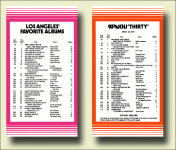As I recall, he returned to KHJ from WIND during 1972. Then later in 1973, he resigned, making a statement to the order of he didn't want to be associated with the current level of professionalism at KHJ.
Does Michael or anyone else remember that?
Yes.
Backstory on that:
Morgan left on October 2, 1970 for WIND, Chicago. He was there a year and the ratings weren't good.
In the April 12, 1973 aircheck linked above, one of the women who wants to be Morganized says she traveled to Chicago while he was there but didn't know what station he was on.
Morgan's reply:
"A lot of people in Chicago didn't know what station I was on."
Morgan came back to L.A. and started talking with Bill Drake about returning to KHJ. The morning numbers were softer under Charlie Tuna, and KHJ PD Ted Atkins wanted RWM back. They agreed to a deal with Morgan, then went to Tuna to tell him that they wanted him to move to 9 a.m.-Noon, but he could keep his morning drive salary. Tuna said no. *
In May of 1973, Bill Drake resigned from RKO after its president Bruce Johnson told Drake he didn't see the need for all the levels within Drake's organization, and asked him to cut Bernie Torres and Bill Watson loose and to begin directly consulting with KHJ's PD at the time, Paul Drew.
Johnson then created a new position, National Program Director, and promoted Drew. He also dismantled Drake's contractually agreed separation between management and programming. For the first time in eight years, the GM had ultimate authority at RKO stations and could tell the PD what to do, talk directly to jocks---things that were strictly forbidden under Drake.
In one of his first meetings with Drew, Johnson asked if KHJ really needed two highly-paid drive jocks (both Morgan and Steele were making $100,000 a year) and suggested Drew fire Steele and replace him with someone who only made $60,000. Drew said KHJ would be better with two strong drive jocks and countered with the idea of giving both Morgan and Steele a $20,000 pay cut---saving the same $40,000 a year.
Drew met with Steele first. Steele quit, and Steele called Morgan before Drew could.
When Paul called RWM, there was no answer. The next morning, Morgan simply didn't show.
Later that day, Morgan sent Drew a telegram from Hawaii: "Weather is here, wish you were beautiful."
Drew refused to consider Morgan as having resigned and continued to run his jock jingle.
Drew found out when Morgan was flying back two weeks later, met him at LAX with people waving "Welcome back, Robert W!" banners....and Morgan walked right past them without a word.
By this point, Mark Elliott and Jerry Butler had also quit KHJ.
Morgan gave his statement to Billboard about "the current level of professionalism", knowing that he, Steele and Jerry Butler would be going wherever Bill Drake landed. At that point, Drake was having conversations with Cox about taking over KFI. When those fell through, he made the deal for KIQQ and the three of them (along with Jim Carson and Billy Pearl, with Bill Watson as PD) were on the air December 7.
(*Drake kept Tuna in the fold briefly, as RKO was planning to flip WGMS, Washington D.C. to Top 40, with Paul Drew as PD. When protests over losing the Classical format caused RKO to reconsider, Tuna was released from his deal with RKO, but not his non-compete for Los Angeles, which would last until July. He commuted to and from San Diego every day to do mornings on KCBQ for four months, then came back to L.A. on KROQ (1500 AM). He left there in October, and by the time Morgan was on K-100 in December, Tuna had been at KKDJ for about six weeks).



